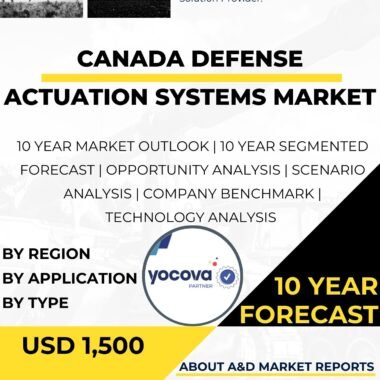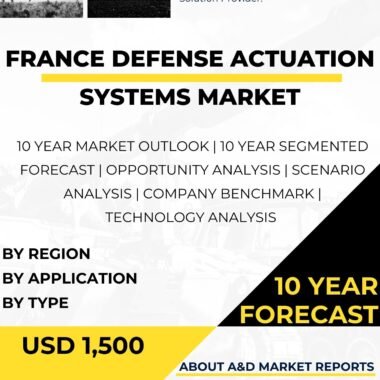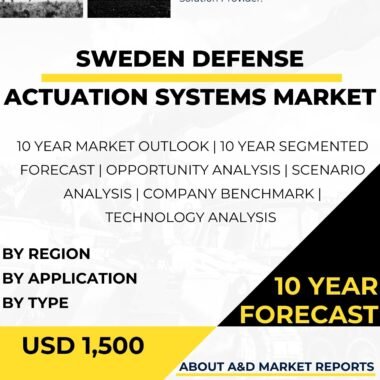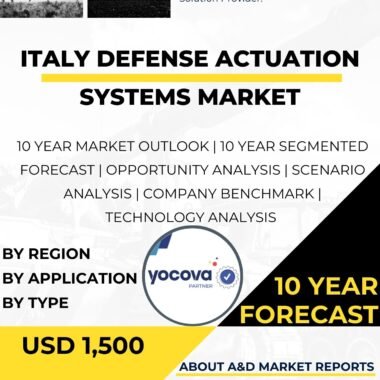Description
The Netherlands Defense Actuation Systems market has witnessed significant growth and development, reflecting the country’s commitment to enhancing its defense capabilities with advanced motion control technologies. Actuation systems play a critical role in modern defense platforms, enabling precise control of various mechanical functions, such as movement, positioning, and stabilization. These systems are vital components in a wide range of defense applications, including military aircraft, naval vessels, armored vehicles, unmanned systems, and precision weapons.
The Netherlands, as a technologically advanced nation with a strong defense industry, recognizes the strategic importance of actuation systems in maintaining a modern and capable Armed Forces. The country’s commitment to innovation and excellence in engineering has driven the development and integration of cutting-edge actuation technologies into its defense platforms.
The Netherlands Defense Actuation Systems market encompasses a diverse range of technologies tailored to specific defense requirements. Electromechanical, hydraulic, pneumatic, and piezoelectric actuation systems are among the key technologies employed in various defense applications.
One of the primary areas of application for actuation systems in the Netherlands Defense market is in military aircraft. Actuators play a crucial role in controlling flight surfaces, such as ailerons, elevators, rudders, and flaps, ensuring precise and dynamic maneuverability. The Netherlands Air Force’s modern fighter aircraft, transport planes, and helicopters rely on advanced actuation systems to optimize performance, increase agility, and maintain stability during various mission profiles.
In the naval domain, actuation systems are integral to the operation of surface vessels and submarines. These systems control critical functions, such as steering, propulsion, and missile launchers. For example, advanced actuation technologies allow naval vessels to conduct complex maneuvers, adjust trim and ballast for optimal buoyancy, and accurately fire precision-guided missiles.
The Netherlands Defense Actuation Systems market also encompasses land-based applications, including armored vehicles and ground-based defense systems. Actuators play a vital role in turret rotation, weapon elevation and depression, and suspension systems, enabling armored vehicles to rapidly respond to threats and engage targets effectively.
The integration of actuation systems in unmanned systems, such as drones and robotic platforms, is another significant area of development in the Netherlands Defense market. Actuators enable the precise control of unmanned vehicles, enabling them to perform a variety of tasks, including reconnaissance, surveillance, target acquisition, and payload delivery.
In the realm of precision weapons, actuation systems play a pivotal role in guidance and control mechanisms. These systems ensure that munitions, such as missiles and smart bombs, accurately track and engage targets with precision, reducing collateral damage and increasing mission success rates.
The Netherlands Defense Actuation Systems market has been driven by collaboration between the government, defense contractors, and research institutions. The Dutch defense industry actively engages in partnerships with domestic and international experts in motion control technologies to develop cutting-edge actuators and drive innovation. These collaborations have led to advancements in materials, miniaturization, and integration of sensors and control systems within actuation technologies.
Export opportunities for actuation systems also exist in the Netherlands Defense market. The country’s expertise in advanced motion control technologies and its reputation for high-quality engineering have generated interest from other nations seeking to upgrade their defense capabilities. Exporting actuation systems not only strengthens the Dutch defense industry but also fosters international cooperation and contributes to global security efforts.
One of the key trends in the Netherlands Defense Actuation Systems market is the integration of smart and adaptive technologies. Actuators equipped with sensors and artificial intelligence (AI) capabilities can monitor their own performance, adjust parameters in real-time, and optimize operation based on external conditions and mission requirements. These smart actuation systems improve efficiency, reduce maintenance needs, and enhance overall platform performance.
The Netherlands Defense Actuation Systems market has also recognized the importance of cybersecurity in ensuring the reliability and resilience of actuation technologies. Protecting actuation systems from cyber threats is critical to prevent unauthorized access, manipulation, or disruption of critical defense functions. The Dutch defense industry places a strong emphasis on incorporating robust cybersecurity measures into actuation systems to safeguard against potential vulnerabilities.
Challenges in the Netherlands Defense Actuation Systems market include the need for continuous research and development to keep pace with evolving defense requirements. As the defense landscape continues to change rapidly, actuation technologies must adapt to meet emerging challenges and exploit new opportunities for innovation.
Additionally, the development and integration of actuation systems must align with broader defense strategies, such as jointness and interoperability. Ensuring that actuation technologies are compatible with other defense systems and platforms allows for seamless coordination and operation within a joint operational environment.
In conclusion, the Netherlands Defense Actuation Systems market has experienced significant growth and innovation, driven by the country’s commitment to leveraging advanced motion control technologies for enhancing its defense capabilities. Actuation systems are critical components in various defense applications, including aircraft, naval vessels, armored vehicles, unmanned systems, and precision weapons. The Netherlands’ dedication to research and development, collaboration with industry experts, and export opportunities position it as a key player in the global actuation systems market. As the defense landscape continues to evolve, the Netherlands is poised to maintain its position at the forefront of actuation technology, ensuring that its defense capabilities remain agile, adaptive, and ready to address the challenges of the future.




